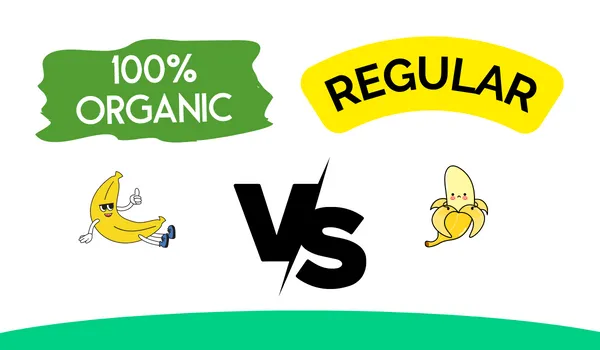Unpeeling The Nutritional Benefits Of Organic And Regular Bananas
Discover the nutritional differences between organic and regular bananas, and why organic bananas may be the healthier choice for you.
Bananas are well-known as essential fruit for a healthy diet. They are a great source of potassium and fiber. Whether you’re looking to add organic bananas to your diet or regular bananas, they’re equally delicious and nutritious. However, organic bananas are known to be more health-friendly than regular bananas. Let’s see how they differ in terms of cost, chemical makeup, environmental impact, and their health benefits.
Benefits of Organic Bananas

When it comes to your health there are many reasons why organic bananas are better. Here are 5 reasons to choose organic bananas:
- Chemicals like pesticides, herbicides, and chemical fertilizers are not used to grow organic bananas. This is called “organic agriculture,” and it means using natural ways to grow food and fertilize the soil.
- They’re said to be tastier and healthier than conventionally cultivated options. Organic bananas are typically packaged in 4-pound boxes and sourced from countries such as Ecuador, Mexico, and Colombia. They’re usually red and yellow in color, with a fruit that is orange or green when ripe.
- They help to support sustainable farming practices and protect the environment. By choosing organic produce, consumers can help support farmers practicing sustainable farming practices and protect the environment.
- They are typically free of pesticides and herbicides, which makes them a healthier choice. Prior to cultivation, organic bananas are required to be pesticide-free, which means they do not come into contact with pesticides during any stage of growth or harvest. Additionally, organic bananas do not have residue from synthetic fertilizers or chemicals like herbicides or pesticides that may harm the environment or farmers’ health.
- They also have a longer shelf life than conventional bananas. They’re typically not exposed to harmful chemicals in the soil after being grown so organic bananas can last longer on the grocery store shelves.
Overall, organic bananas are a healthier choice for consumers who value organic agriculture practices for their environmental benefits and healthy food safety standards.
What You Should Know About Regular Bananas?
- Regular bananas are healthy and nutritious fruits that are typically yellow-fleshed bananas, often referred to as Cavendish bananas.
- They are commonly eaten raw or cooked and have a crisp texture.
- They are commonly treated with pesticides and other chemicals to reduce crop loss and make them cheaper.
- They are widely available and typically cheaper than organic bananas.
- They are also a great source of potassium, vitamin C, dietary fiber, and vitamin B6.
- They are typically grown with the use of harmful chemicals, which can compromise their nutritional value.
It is important to consider the environmental impacts of organic versus conventional farming when consuming organic or regular bananas.
Get Your Hand on Your Eco-Friendly Living Starter Guide!
Regular Bananas vs. Organic – Make The Right Choice

When it comes to bananas, organic is typically seen as the superior option because they’re grown without the use of pesticides, fertilizers, or other harmful chemicals.
In terms of nutrition, organic bananas have more vitamins and minerals than conventional bananas. They also have a higher amount of antioxidants and are higher in dietary fiber and potassium.
However, conventional bananas are cheaper and more widely available than organic bananas.
There is some doubt over whether or not regular bananas containing genetically modified ingredients are safe to eat. Typically, regular bananas are harvested before they are fully ripe to avoid being bruised during shipping and to increase their storage life. Your tastes and health objectives should determine the best choice.
The Main Differences Between Organic and Regular Bananas?
Regular bananas are the most commonly consumed type of banana. They are grown without the use of pesticides and other chemicals, making them healthier and more nutritious than conventional bananas. Commonly known as “GOS” bananas, these organic varieties are also typically longer-lasting on the grocery shelf than conventional bananas.
Organic bananas are grown with organic fertilizers and pesticides to protect the environment and farmers’ livelihoods. The nutrients in organic bananas tend to be higher in vitamin C and potassium, which can help support healthy immune systems and overall well-being. Organic bananas also tend to have a longer shelf life than conventional bananas.
As with conventional bananas, organic bananas offer a nutritious snack option that can help build healthy brain cells and blood circulation. They’re also an excellent source of potassium and vitamins B6, E, and C. Both organic and regular bananas provide a healthy snack option for consumers who care about the health of the environment and farmers’ livelihoods.
The Cost
Organic bananas cost more than regular bananas due to the use of fewer pesticides and chemical treatments. The organic banana has to meet certain standards in order to be considered organic. These organic standards require farmers to use organic fertilizers, pesticides, and other chemicals only when they are necessary.
Also, organic bananas can’t be grown with pesticides, herbicides, or chemical fertilizers made from chemicals. The organic banana also has higher production costs because it is typically grown in a specially managed organic plantation. This ensures that pesticides are not allowed near the plant and ensures higher-quality fruit growth.
Overall, organic bananas are a high-quality choice for those looking for a food that is free from harmful pesticides and chemical treatments.
The Amount of Chemical

Organic bananas do not contain synthetic nitrogen fertilizers, antibiotics, genetic engineering, synthetic hormones, or other banned methods. Instead, organic farmers rely on natural fertilizers and pesticides to protect their crops. Regular bananas are sprayed with pesticides and chemical pesticides to keep pests and fungus away.
Because organic farmers use strategies such as crop rotation, bug traps, and deterrents like sticky paper and pheromones to protect their crops, organic bananas have higher sugar levels than regular bananas as a result of their natural ripening process.
In addition to higher sugar levels, organic bananas also contain more nutrients than regular bananas due to the lack of pesticides in their fruit. Overall, organic bananas are a better choice for those looking for a pesticide-free food with a unique flavor and nutrient profile.
The Environmental Impact in Choice
Organic bananas are grown without the use of harmful pesticides and synthetic fertilizers, which helps farmers produce organic bananas using sustainable methods. Organic bananas are grown using organic composts and other organic fertilizers to promote a healthy and sustainable farming ecosystem.
This lowers the need for chemical/fertilizer treatment, which can be harmful to the surrounding environment. In addition, organic farming promotes soil fertility and minimizes the use of chemicals, which can be harmful to both humans and the environment.
All in all, organic bananas contain higher levels of antioxidants and vitamin C than regular bananas and provide benefits to both humans and the natural world.
Health & Nutrition
Organic bananas may contain more antioxidants and vitamin C than regular bananas. Organic bananas are typically grown without the use of synthetic pesticides and herbicides, which can be harmful to human health. Regular bananas are cheaper and more widely available than organic bananas.
Organic bananas often have a longer shelf life than conventional bananas, while organic bananas typically cost more than regular bananas. Also, bananas that aren’t organic often last longer than bananas that are. Overall, organic and regular banana differences mainly depend on the production methods used in growing them.
Which Is One is Better? Between Regular and Organic Bananas?

Most of the time, regular bananas are cheaper and easier to find, but it can be hard to stay away from pesticides and other chemicals. Some regular bananas last longer than organic bananas, so you may find them at the grocery store longer than organic bananas.
Regular bananas often have a larger fruit size, with a thick peel, which makes them easier to handle and eat. The nutritional content of organic bananas is comparable to that of conventional bananas, but organic bananas tend to be higher in antioxidants and vitamin D.
Most people know the yellow Cavendish banana, but there are more than 1,000 other kinds of bananas grown around the world.
Studies have shown that GMO foods are safe to eat, and the FDA has said that they are. But some people value organic food more for what it does for the environment than for what it does for their health.
Are Organics Bananas Better?
When it comes to organic vs regular bananas, organic bananas are better than conventional bananas due to their cultivation practices. They also tend to have higher nutritional value and make for a great sustainable, and wholesome option.”
Frequently Asked Questions
What are the benefits of eating organic bananas?
Organic bananas are a great choice for health-conscious consumers as they reduce exposure to potentially harmful chemicals, pesticides, and fertilizers. They’re also typically more expensive and harder to find than regular bananas, so shopping for organic produce maybe a more costly option.
However, organic produce has seen an increase in sales and demand in recent years, making organic bananas easier to find.
Organic bananas provide a variety of health benefits, such as being a great source of vitamins, minerals, and dietary fiber. They also contain antioxidants that can help protect your cells from free radical damage and improve overall health. Additionally, organic bananas contain probiotics that can help boost the immune system and prevent digestive problems. Hence, organic bananas are an excellent addition to any healthy and balanced diet.
Do organic bananas taste different?
Yes, organic bananas do taste different than conventional bananas. Generally speaking, organic bananas have a sweeter flavor due to the higher levels of nonvolatile chemicals, notably sugars and acids. Additionally, organic bananas may have a stronger, sweeter smell than conventional bananas.
When comparing organic and conventional bananas, look at the price tag and peel for clues as to which is which. Doing a smell test could help you determine if the banana is organic or conventional. Of course, some people may not notice any difference between organic and conventional bananas at all!
How do you know if your bananas are organic?
If you’re looking to buy organic bananas, then there are several ways to help you figure out whether a banana is organic or not.
First of all, organic bananas tend to be pricier than non-organic ones, so if you notice a higher price tag, it’s likely that the bananas are organic. Another way to tell is to look at the color and spots on the peel; organic bananas typically have smaller and darker spots on their peels.
You can also use your nose! Organic bananas tend to have a stronger, sweeter scent when compared to conventional ones.
Additionally, some bananas carry product codes which indicate how they were grown. If the code starts with 94011, then chances are that the bananas are organic.
Finally, look for certification labels such as Non-GMO Project Verified or Certified Organic; these labels indicate that the banana has been verified free from genetic modification.
Final Thoughts on Organic Bananas vs Regular Bananas
Organic bananas are better than regular bananas because they are produced without pesticides, synthetic fertilizers, or genetically modified organisms. They also don’t have any artificial colors, flavors, or preservatives. If you want to get all the benefits of organic bananas, it is best to buy them organic. And if you want to learn more about organic bananas, here is an article that will help you. Share it on social media and educate your friends and family!
References:
https://gardeniaorganic.com/do-organic-bananas-turn-yellow/
https://www.webmd.com/diet/guide/healthy-eating-and-diet-real-life-tips
https://www.ewg.org/enviroblog/2014/04/bananas






